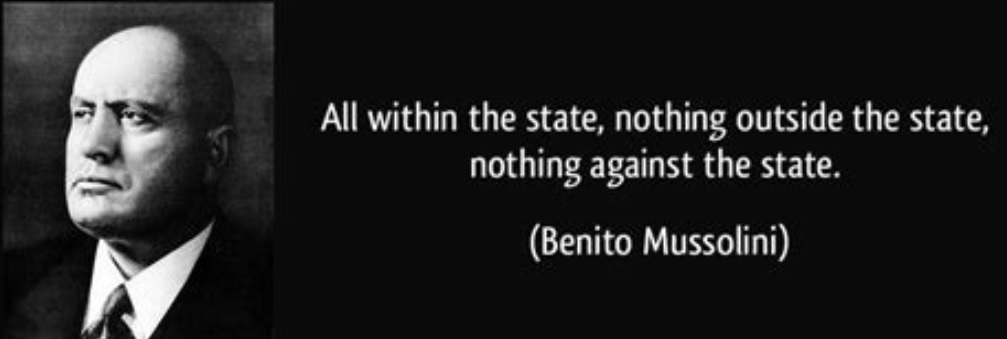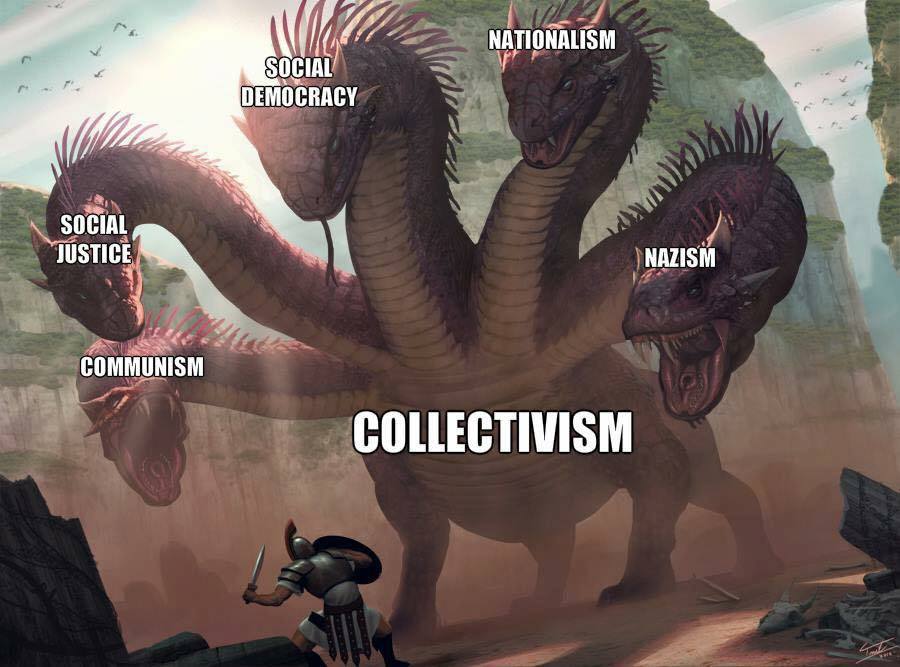October 25, 2024 by Dan Mitchell @ International Liberty
Other than noting that it is a form of collectivism, coercion, and interventionism, I have not paid much attention to fascism.
Today, we’ll take a closer look at this statist ideology, and we’ll start with this video from Matt Kibbe. And since I’ll be focusing on the economics of fascism, I urge people to pay close attention to the part of the video starting at 9:25.
As you can see from the video, there are several components of fascism, including a poisonous type of ethnic solidarity and a twisted version of nationalism.
The part I’ll focus on, though, is the statism. As illustrated by the Mussolini quote, government is the all-important entity for fascists.
Individual liberty is suppressed, often with violence.
Which is why I don’t think a left-right spectrum is a good way of describing political and philosophical divisions.
I prefer this triangle, which shows libertarianism at the top of the triangle and competing strains of authoritarianism at the lower points.
Now let’s look at what others have written about fascism.
The Foundation for Economic Education has several must-read articles.
We’ll start with some of the highlights from Larry Reed’s column.
…on July 29, 1921…Adolf Hitler assumed the leadership of the National Socialist German Workers Party… Note the formal, official name of the party. It was not the National Capitalist German Workers Party. It was not the National Free Market German Workers Party. Nor was it the National Christian German Workers Party.…
The lie that Nazism was capitalist instead of what the Nazis themselves said it was (namely, socialist) derives from the fact that the Hitler regime did not engage in wholesale or widespread nationalization of businesses. In the Third Reich, you might retain legal title to a factory but if you did not do as the Nazis ordered, you would be, shall we say, dispatched. …Lenin, Mao, Pol Pot, Castro, Hitler, Mussolini were all anti-capitalist peas in the same socialist, collectivist pod.
Here’s some of what Rainer Zitelmann wrote about Hitler’s anti-market views.
How important Hitler considered the question of state-controlled planning of the economy to be can be seen from the fact that in August 1936 he personally wrote a “Memorandum on the Four-Year Plan 1936.” In this memorandum his admiration and fear of the Soviet system of planned economy were expressed… Hitler was convinced of the superiority of the Soviet planned economy system over the capitalist economic system. This must be regarded as an essential reason why he so vehemently demanded and enforced the extension of state control of the economy in Germany as well. …Hitler…emphasized in his last radio address on January, 30, 1945, “that the age of unrestricted economic liberalism had outlived itself.”
Now let’s look at some excerpts from Jon Miltimore’s column.
…the word is right there in the name: National Socialism. If you read the speeches and private conversations of the Nazi hierarchy, it’s clear they loved socialism and despised individualism and capitalism. …there is no question they saw socialism as the future and despised bourgeoisie capitalism. …So what sets National Socialism apart from Marxism?
There are two primary differences.
The first is that Hitler and Goebbels fused their socialism with race and German nationalism… The second difference is that National Socialists were less concerned with directly controlling the means of production. …the Nazis never initiated a widespread nationalization of industry, but…this was a distinction without a difference. …European fascism was simply a different shade of socialism… Like Marx, the Nazis loathed capitalism and saw the individual will and individual rights as subordinate to the interests of the state.
And here are some passages from Emmanuel Rincón’s column.
…a deep discussion about the ideological roots of fascism…is necessary to know in depth the life, beliefs, and principles of both its political leaders (such as Benito Mussolini) and its philosophical leaders (such as Giovanni Gentile). Mussolini was a…member of the Italian Socialist Party for 14 years. In 1910, he was appointed editor of the weekly La Lotta di Classe (The Class Struggle)…
Giovanni Gentile…was the intellectual author of the “doctrine of fascism,” which he wrote in conjunction with Benito Mussolini. …Gentile went so far as to declare “Fascism is a form of socialism, in fact, it is its most viable form.” One of the most common reflections on this is that fascism is itself socialism based on national identity. …unlike traditional socialism, it did not consider that the state should own all the means of production, but more that it should dominate them. The owners of industries could “keep” their businesses, as long as they served the directives of the state.
Let’s close by shifting from economic theory to politics.
Kamala Harris and others have accused Donald Trump of being a fascist, in large part based on his perceived willingness to use the power of government to go after his enemies and trample constitutional norms.
Since I’m not a Trump fan, I’m willing to believe just about any negative charge against him, but I also believe that sauce for the goose should be sauce for the gander.
If some of Trump’s actions have been bad (and they have), then we also should recognize and condemn similar misbehavior on the other side.
- Weaponizing the IRS against political opponents.
- Suppressing and/or regulating political speech.
- Using the pandemic as an excuse to restrict freedom.
P.S. I can’t resist making a final observation about the economics of fascism. The main difference between socialism and fascism is that the former features government ownership and government control while the latter features private ownership and government control.
We do have a few small sectors of our economy run by the government (Postal Service, air traffic control, etc), but it’s far more common to have big sectors that are heavily regulated and indirectly controlled by government (health care, agriculture, banking, trade, etc). So you could argue that one of America’s main economic problems is fascism. But since that term has all sorts of other negative connotations, it’s better to say that the problem is cronyism or interventionism.



No comments:
Post a Comment